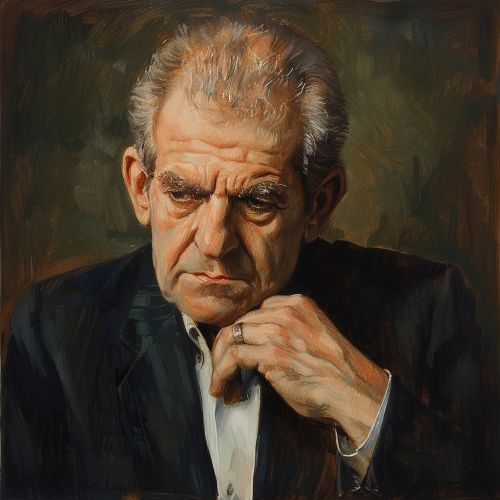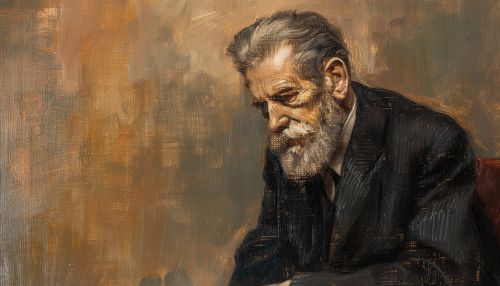Jacques Lacan
Early Life and Education
Jacques Marie Émile Lacan was born on April 13, 1901, in Paris, France. He was the eldest of three children in a bourgeois Catholic family. Lacan's early education was marked by a rigorous Jesuit schooling, which instilled in him a strong foundation in classical literature and philosophy. He later attended the prestigious Lycée Louis-le-Grand, where he excelled in his studies and developed an interest in psychiatry and psychoanalysis.
In 1920, Lacan enrolled at the University of Paris to study medicine, eventually specializing in psychiatry. During his medical training, he was influenced by the works of Sigmund Freud and became deeply interested in psychoanalysis. Lacan completed his medical degree in 1932, with a thesis on paranoid psychosis, which was later published as "De la psychose paranoïaque dans ses rapports avec la personnalité" (On Paranoid Psychosis in its Relations to the Personality).
Career and Contributions
Early Career
After completing his medical degree, Lacan began working at the Sainte-Anne Hospital in Paris, where he gained practical experience in psychiatry. During this time, he became acquainted with several prominent figures in the field, including Henri Ey, Georges Dumas, and Gaëtan Gatian de Clérambault. Lacan's early work focused on the study of psychosis, particularly paranoia, and he published several influential papers on the subject.
The Mirror Stage
One of Lacan's most significant contributions to psychoanalysis is his theory of the Mirror Stage. First presented in 1936 at the International Psychoanalytic Congress in Marienbad, the Mirror Stage describes the process by which an infant recognizes its own reflection in a mirror, leading to the formation of the ego. According to Lacan, this moment of recognition is crucial in the development of the individual's sense of self and is marked by a tension between the idealized image in the mirror and the fragmented reality of the infant's body.
Structuralism and the Return to Freud
In the 1950s, Lacan became increasingly interested in structuralism, a theoretical framework that emphasizes the underlying structures of language and culture. He began to incorporate structuralist ideas into his psychoanalytic practice, arguing that the unconscious is structured like a language. This led to his famous dictum, "the unconscious is structured like a language," which became a cornerstone of his work.
Lacan's return to Freud involved a re-reading of Freud's texts through the lens of structuralism and linguistics. He sought to reinterpret Freud's theories in light of contemporary developments in linguistics, particularly the work of Ferdinand de Saussure and Roman Jakobson. Lacan's seminars during this period, particularly Seminar XI: "The Four Fundamental Concepts of Psychoanalysis," are considered some of his most important contributions to the field.
Key Concepts
The Real, the Imaginary, and the Symbolic
Lacan's theoretical framework is built around three interrelated orders: the Real, the Imaginary, and the Symbolic. These orders represent different dimensions of human experience and are central to his understanding of psychoanalysis.
- The Real: The Real is the domain of experience that is beyond language and representation. It is the realm of raw, unmediated reality that resists symbolization and is often associated with trauma and the limits of human understanding.
- The Imaginary: The Imaginary is the realm of images and illusions, where the ego is formed through identification with idealized images. It is closely related to the Mirror Stage and the formation of the self.
- The Symbolic: The Symbolic is the domain of language, culture, and social structures. It is the realm of the Law of the Father, which imposes order and meaning on human experience through language and symbolic systems.
The Name-of-the-Father
The concept of the Name-of-the-Father is central to Lacan's theory of the Symbolic order. It refers to the paternal function that introduces the child into the realm of language and social norms. The Name-of-the-Father represents the authority of the symbolic law and is crucial in the formation of the individual's identity and subjectivity.
The Objet Petit a
The objet petit a (object little a) is another key concept in Lacan's work. It represents the unattainable object of desire that drives human behavior. The objet petit a is the cause of desire, constantly eluding the subject and perpetuating the cycle of desire and lack. It is closely related to Lacan's theory of the Real, as it embodies the gap between the subject's desires and the symbolic order.


Influence and Legacy
Psychoanalysis
Lacan's work has had a profound impact on the field of psychoanalysis. His reinterpretation of Freud's theories and his incorporation of structuralist and linguistic ideas have led to the development of what is now known as Lacanian psychoanalysis. Lacan's emphasis on language, desire, and the symbolic order has influenced numerous psychoanalysts and theorists, including Slavoj Žižek, Julia Kristeva, and Jacques-Alain Miller.
Philosophy
Lacan's ideas have also had a significant influence on contemporary philosophy, particularly in the fields of post-structuralism and continental philosophy. Philosophers such as Michel Foucault, Gilles Deleuze, and Jean Baudrillard have engaged with Lacan's work, incorporating his concepts into their own theories. Lacan's emphasis on the role of language and the symbolic order has also influenced the development of deconstruction, particularly in the work of Jacques Derrida.
Cultural Theory
Lacan's theories have been widely applied in the field of cultural theory, particularly in the analysis of literature, film, and art. His concepts of the Mirror Stage, the Real, the Imaginary, and the Symbolic have been used to analyze the construction of identity, the nature of desire, and the role of language in shaping human experience. Lacanian theory has been influential in the work of cultural theorists such as Homi K. Bhabha, Judith Butler, and Kaja Silverman.
Criticisms and Controversies
Accessibility and Style
One of the main criticisms of Lacan's work is its complexity and opacity. Lacan's writing style is often dense and difficult to understand, making his ideas inaccessible to many readers. His use of specialized terminology and abstract concepts has led to accusations of obscurantism and elitism. Despite these criticisms, Lacan's work continues to be studied and debated by scholars and practitioners in various fields.
Theoretical Rigor
Lacan's theories have also been criticized for their lack of empirical support and scientific rigor. Some critics argue that his concepts are too abstract and speculative, lacking the empirical grounding necessary for scientific validation. Others have questioned the coherence and consistency of his ideas, pointing to contradictions and ambiguities in his work.
Ethical and Clinical Implications
Lacan's approach to psychoanalysis has also been the subject of ethical and clinical debates. Some critics argue that his emphasis on language and the symbolic order neglects the importance of the therapeutic relationship and the emotional needs of patients. Others have raised concerns about the potential for Lacanian analysis to reinforce existing power structures and social norms, rather than challenging them.
Selected Works
Lacan's extensive body of work includes numerous published papers, seminars, and books. Some of his most important works include:
- "Écrits" (1966): A collection of Lacan's most significant papers, including "The Mirror Stage as Formative of the I Function" and "The Agency of the Letter in the Unconscious."
- "The Four Fundamental Concepts of Psychoanalysis" (1973): A transcription of Lacan's eleventh seminar, in which he explores key psychoanalytic concepts such as the unconscious, repetition, transference, and the drive.
- "Seminar XX: Encore" (1975): A transcription of Lacan's twentieth seminar, focusing on the nature of desire, love, and sexual difference.
